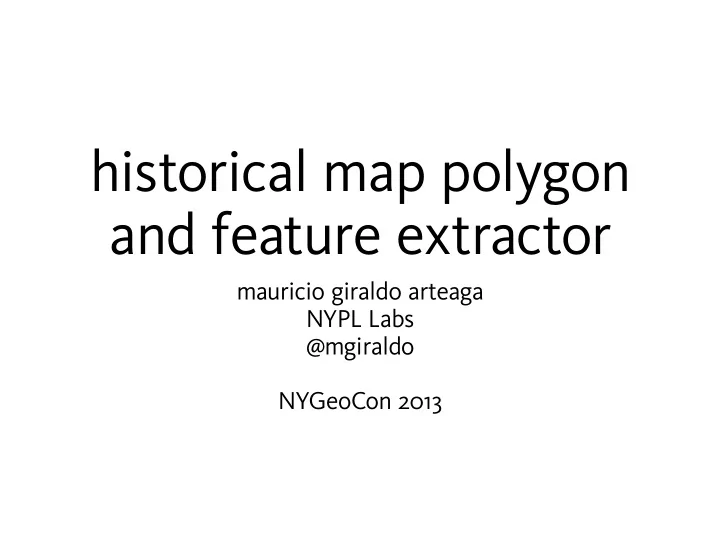

historical map polygon and feature extractor mauricio giraldo arteaga NYPL Labs @mgiraldo NYGeoCon 2013
background
~120k polygons produced in three years by staff and volunteers (NYPL ♥ volunteers)
building =
building = not paper-colored
building = not paper-colored completely enclosed by black lines
building = not paper-colored completely enclosed by black lines dashed lines are not walls
building = not paper-colored completely enclosed by black lines dashed lines are not walls > 20m 2 (~180ft 2 )
building = not paper-colored completely enclosed by black lines dashed lines are not walls > 20m 2 (~180ft 2 ) < 3,000m 2 (~27,000ft 2 )
building = not paper-colored completely enclosed by black lines dashed lines are not walls > 20m 2 (~180ft 2 ) < 3,000m 2 (~27,000ft 2 ) + attributes (color, dots, crosses...)
process
https://github.com/NYPL/ map-vectorizer try it!
gdal_polygonize.py generates polygons automagically!
$ gdal_polygonize.py test.tif -f "ESRI Shapefile" test.shp test
$ gdal_polygonize.py test.tif -f "ESRI Shapefile" test.shp test
gdal_polygonize.py generates polygons automagically! (not really)
we need to optimize the input
differences in resampling cubic nearest neighbor
differences in resampling cubic nearest neighbor
we need to simplify the output (for those polygons that we care about)
pts = spsample(polygon, n=1000, type="hexagonal")
pts = spsample(polygon, n=1000, type="regular") pts = spsample(polygon, n=1000, type="hexagonal")
pts = spsample(polygon, n=1000, type="regular") pts = spsample(polygon, n=1000, type="random") pts = spsample(polygon, n=1000, type="hexagonal")
x.as = ashape(pts@coords,alpha=2.0)
x.as = ashape(pts@coords,alpha=2.0) lower alpha produces more concave shapes (good) but holes may start appearing (bad)
Ramer–Douglas–Peucker and other point reduction algorithms can be considered
66,056 polygons produced in one day (as opposed to years)
but: adjacency is not being enforced false positives/negatives buildings may also overlap
we need to validate the output http://buildinginspector.nypl.org *not included in the paper
2 weeks later...
341,005 flags for 66,055 unique polygons 62,402 polygons with consensus Yes 84.2% Fix 6.4% No 9.4% “consensus” = 75%+ agreement of 3+ flags
no sleep till Brooklyn 14k+ more polygons
thank you mauricio giraldo arteaga NYPL Labs @mgiraldo NYGeoCon 2013
Recommend
More recommend